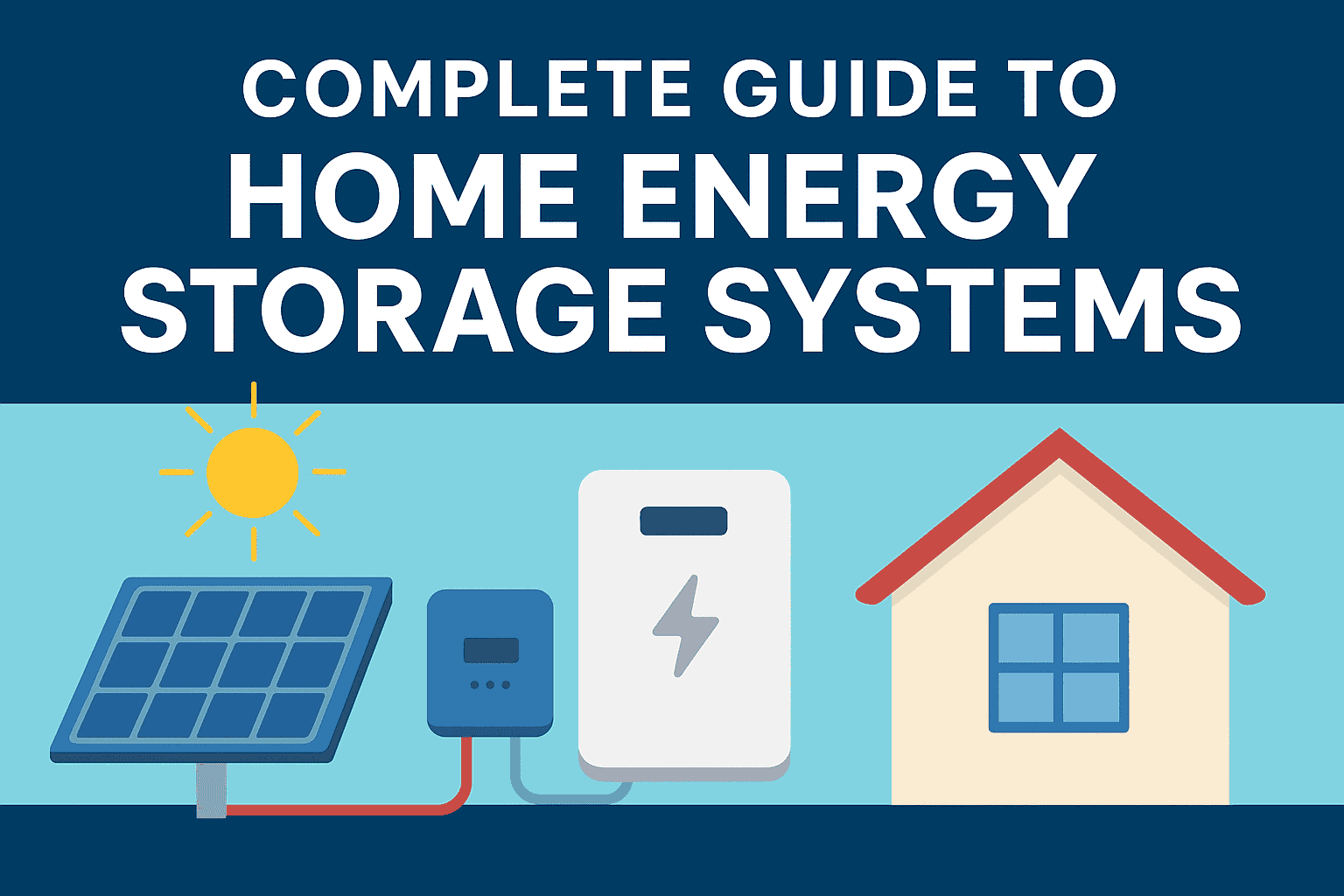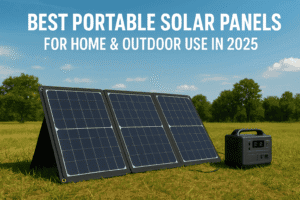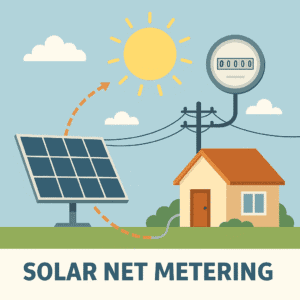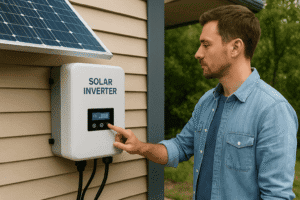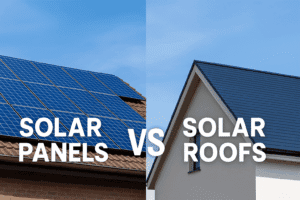Complete Guide to Home Energy Storage Systems (2025 Edition)
Imagine a future where your home doesn’t just consume electricity but produces, stores, and manages it intelligently. A future where blackouts don’t disrupt your evenings, where your energy bills drop dramatically, and where your household actively contributes to a cleaner planet. That future isn’t far away, it’s already here, thanks to home energy storage systems.
But let’s face it: most homeowners are confused when it comes to energy storage. You’ve probably heard about solar panels, smart inverters, or even backup batteries, but how do they all connect? Is a storage system just a glorified battery, or does it play a bigger role in your home’s energy independence? And most importantly: is investing in a home energy storage system really worth it in 2025 and beyond?
In this complete guide to home energy storage systems, we’ll break down everything you need to know, from how these systems work, to the benefits, types, costs, installation process, and whether they’re the right choice for your household.
Here’s why you should keep reading:
- You’ll discover how home energy storage systems can save you thousands of dollars over time.
- You’ll learn how they work with solar panels and smart inverters to maximize your efficiency.
- You’ll see whether they can protect you against rising energy prices and power outages.
- You’ll get clarity on whether to choose lithium-ion, lead-acid, or even thermal storage solutions.
- You’ll understand the latest trends for 2025, including government incentives and smart grid integration.
- You’ll find out how to avoid common mistakes homeowners make when selecting a system.
- You’ll get answers to frequently asked questions real people search for on Google.
Whether you’re already running solar panels, planning to cut energy waste, or just exploring the latest green technology, this guide will give you everything you need to make an informed decision about home energy storage systems.
Let’s dive in.
What Are Home Energy Storage Systems?
At their core, home energy storage systems allow you to store excess electricity for later use. Typically, they work in tandem with solar panels, but they can also store power from the grid during off-peak hours. Think of them as a “bank account” for energy: you deposit when there’s surplus, and withdraw when demand spikes or the sun isn’t shining.
How Do Home Energy Storage Systems Work?
- Energy Generation – Solar panels or wind turbines generate electricity.
- Conversion – A solar inverter (see our complete guide to solar inverters for homes) converts DC power into usable AC.
- Storage – Excess energy flows into the battery or thermal storage unit.
- Discharge – When energy is needed, the stored electricity is released back to your home.
- Smart Management – Many systems include intelligent software that optimizes energy use based on time-of-day pricing and consumption patterns.
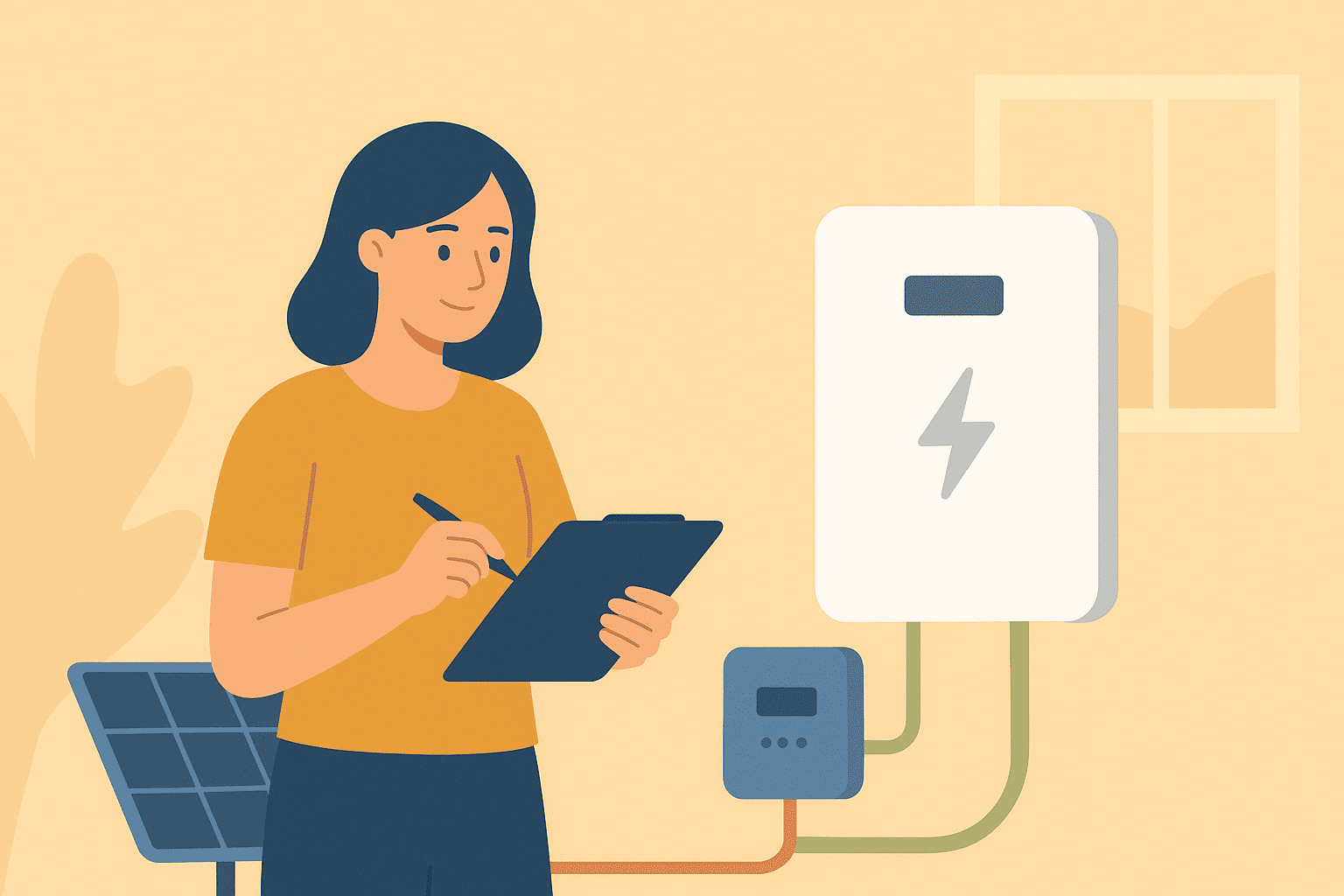
Benefits of Home Energy Storage Systems
- Energy Independence – Reduce reliance on the grid.
- Lower Bills – Store cheap off-peak energy and use it during peak hours.
- Backup Power – Keep your home running during outages.
- Eco-Friendly – Maximize the value of renewable sources like solar and wind.
- Future-Proofing – Adapt to rising energy costs and evolving smart home technologies.
Types of Home Energy Storage Systems
1. Lithium-Ion Batteries
The most popular choice due to high efficiency, compact size, and long lifespan.
2. Lead-Acid Batteries
Cheaper upfront, but bulkier and less efficient.
3. Flow Batteries
Durable and scalable, but currently more expensive.
4. Thermal Energy Storage
Stores heat or cold instead of electricity. Growing in popularity for heating and cooling applications.
How Much Do Home Energy Storage Systems Cost?
| System Type | Average Cost (2025) | Lifespan | Efficiency | Best For |
|---|---|---|---|---|
| Lithium-Ion | $8,000 – $16,000 | 10–15 yrs | 90–95% | Solar users & long-term savings |
| Lead-Acid | $5,000 – $8,000 | 5–8 yrs | 70–80% | Budget-conscious users |
| Flow Battery | $15,000 – $30,000 | 20+ yrs | 70–85% | Large homes & scalability |
| Thermal Storage | $4,000 – $10,000 | 10–20 yrs | N/A | Heating/cooling needs |
Are Home Energy Storage Systems Worth It in 2025?
Yes, but it depends on your situation. If you already own solar panels, adding a storage system allows you to maximize your savings and resilience. If you live in an area with frequent blackouts or rising electricity rates, the payoff is even greater.
Key Factors to Consider Before Installing
- Energy Needs – How much backup do you really need?
- System Size – Oversizing leads to wasted money; undersizing leaves gaps.
- Compatibility – Ensure your inverter and solar panels integrate properly.
- Warranty – Look for at least 10 years coverage.
- Government Incentives – Many regions offer rebates or tax credits.
How Home Energy Storage Systems Integrate with Solar Panels
Pairing storage with solar panels unlocks the system’s full potential. During the day, your panels generate electricity; excess power charges the storage unit. At night, instead of buying electricity, you use your stored energy. Learn more in our post on energy-wasting mistakes homeowners make.
Common Energy Wasting Mistakes with Storage Systems
- Choosing the wrong battery size.
- Not monitoring energy usage.
- Ignoring smart energy management features.
- Poor maintenance or incorrect installation.
For a full breakdown, see our guide on common energy wasting mistakes.
DIY vs Professional Installation
While some systems claim DIY compatibility, most homeowners benefit from professional installation to ensure safety, warranty validity, and optimal performance.
Smart Home Integration
Many home energy storage systems can connect with smart plugs and devices. Check out our list of the best smart home devices for energy efficiency to see how integration can boost savings.
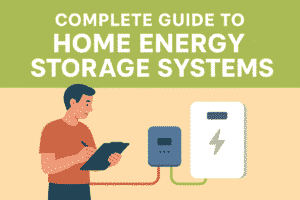
Home Energy Storage and Window Efficiency
Surprisingly, storage systems work even better when paired with a well-insulated home. Consider upgrading with energy-efficient window treatments to reduce heating and cooling waste.
Weatherproofing and Energy Storage
A poorly insulated home wastes stored energy. Learn practical tips in our DIY weatherproofing guide.
People Also Ask (FAQs)
How long can a home energy storage system power a house?
Depending on size, most systems can power essentials (lights, fridge, Wi-Fi) for 12–24 hours.
Do I need solar panels to install a home energy storage system?
Not necessarily. You can still store cheap grid energy for use during peak pricing.
How long do home energy storage systems last?
Lithium-ion systems usually last 10–15 years, while flow batteries can exceed 20 years.
Are home energy storage systems environmentally friendly?
Yes, they reduce reliance on fossil fuels, especially when paired with renewable generation.
Can home energy storage systems increase property value?
Yes, homes with solar plus storage are more attractive to eco-conscious buyers.
Conclusion
Home energy storage systems are no longer a futuristic luxury, they’re quickly becoming a smart, cost-effective necessity for homeowners in 2025. By combining solar power, intelligent management, and reliable storage, you can dramatically reduce your bills, keep the lights on during outages, and take control of your household energy use.
Whether you’re motivated by saving money, reducing your carbon footprint, or simply preparing for an unpredictable energy market, investing in home energy storage systems is one of the most powerful moves you can make this year.
To recap:
- They make solar energy more efficient.
- They protect your home from outages.
- They offer long-term financial benefits.
- They position your home for the energy future.
If you’re serious about energy independence, this is the time to act. Pairing storage with insulation, smart home devices, and efficient habits creates the ultimate blueprint for a modern, sustainable home.
In short, home energy storage systems are not just a trend, they’re the foundation of tomorrow’s energy-smart households. Don’t wait for rising electricity prices or another blackout to force your hand. Start planning your system today, and step confidently into the future of clean, reliable, affordable energy.
This post was on Complete Guide to Home Energy Storage Systems (2025 Edition)

